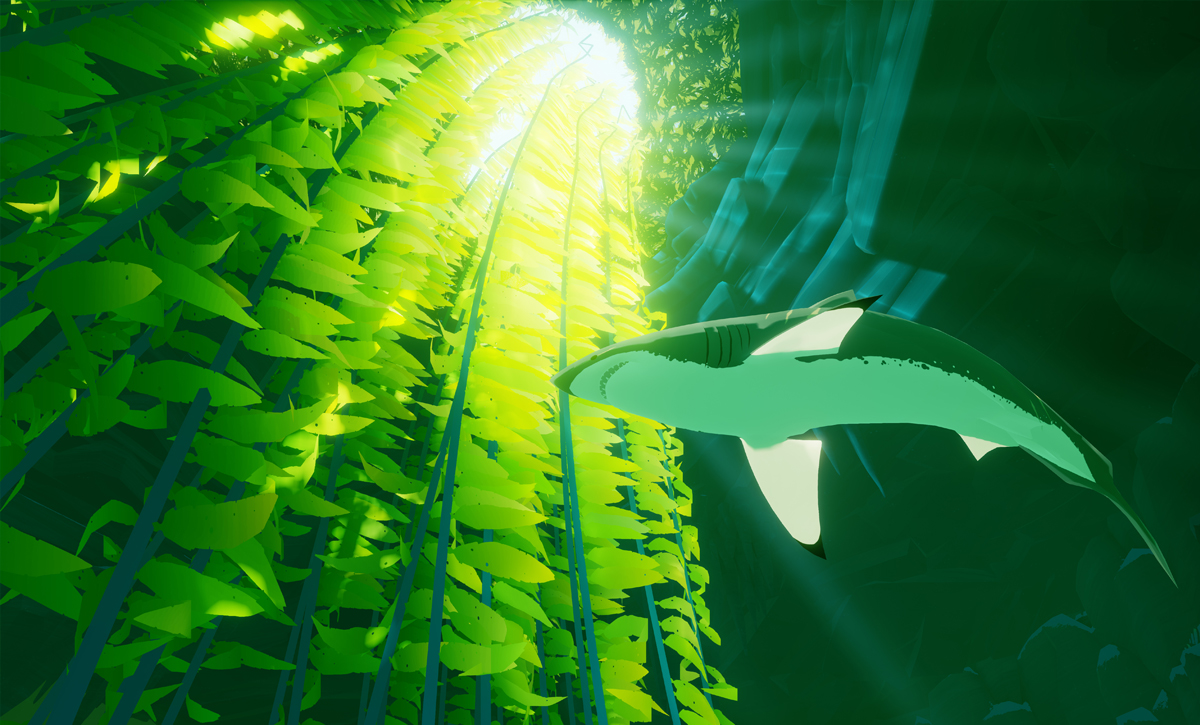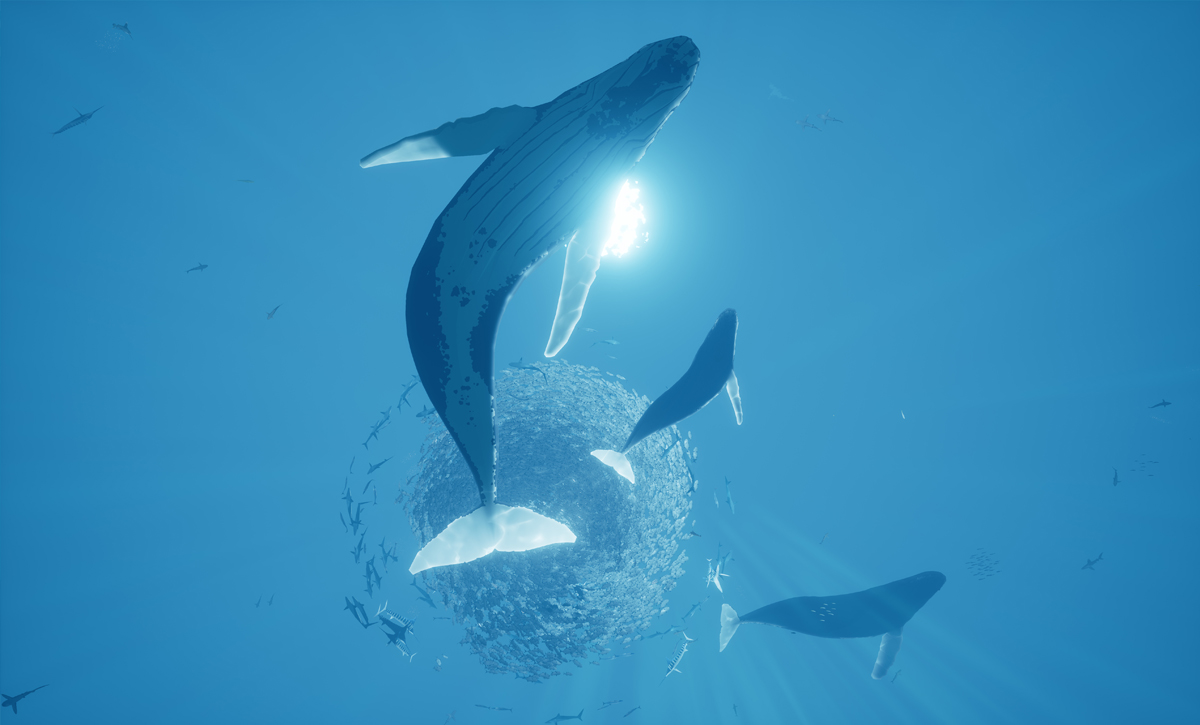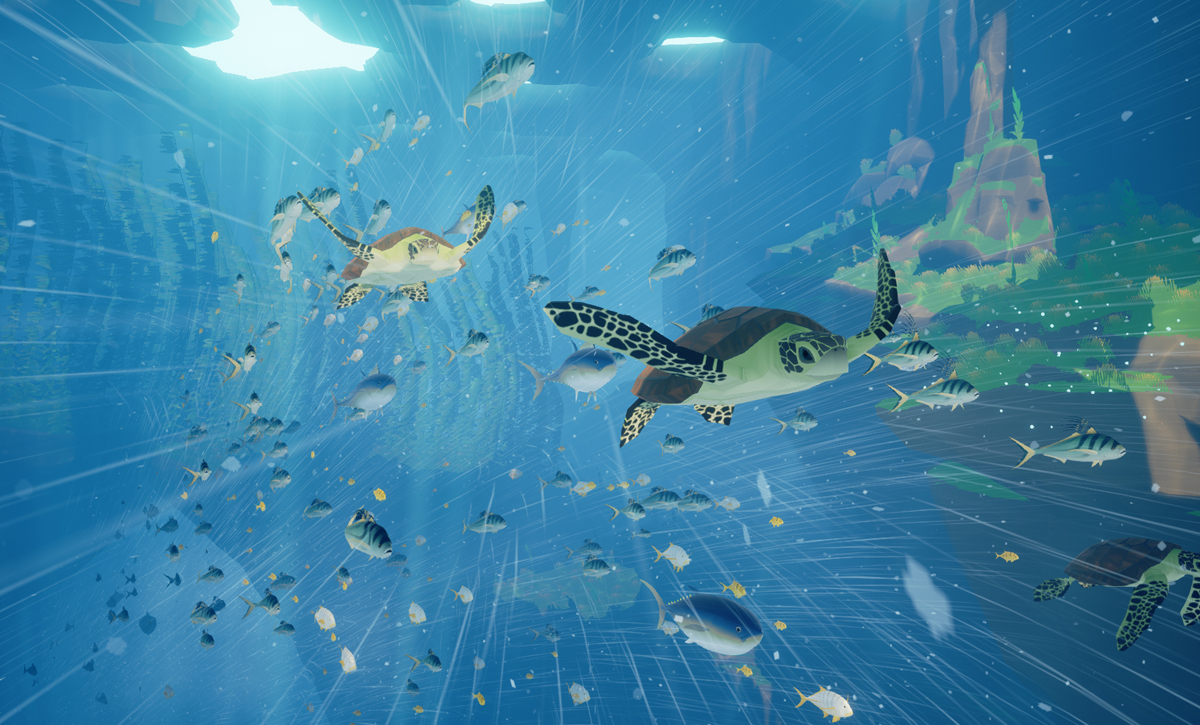I think by now we can all agree that gaming can act as an artistic platform to great success. By no means are all games works of art, and nor do they need to be, but it undoubtedly helps the industry in terms of sheer variety when developers produce unique and artistic work. Journey is one such game — a game that encapsulates the originality and creativity possible in game design. The new PS4 and PC game Abzû is a sequel to Journey in all but name, but is Abzû’s underwater exploration the next artistic masterpiece for the gaming industry, or a just derivative disappointment?
Abzû is developer Giant Squid’s debut game, but it is backed by an experienced and talented team. The studio is helmed by Matt Nava, also known for his work as art director on Thatgamecompany’s much-adored games Journey and Flower. The influences of Journey are obvious here, both in gameplay and in art direction. Like Journey, the game can be completed in a single sitting, and it emphasizes mystery and player autonomy to create an experience that truly feels exploratory and dynamic.
In Abzû, the player finds themselves controlling a nameless diver as they float through wondrous seascapes and interact with a variety of wildlife. Even the diver’s design is reminiscent of Journey’s silent protagonist, with a mysteriously obscured face illuminated by two glowing eyes. Thrust straight in with no explanation, the player is immediately filled with a sense of mystery and a desire to explore, enticed further by the outstanding art direction and stirring score. As you progress you’ll come across strange hieroglyphs and monumental buildings of an ancient race reclaimed by the ocean, all adding to the sense of intrigue the desire to explore further.
Abzû is a marvel to behold.
You might think the sea would require swapping the reds and yellows of Journey’s deserts exclusively for blues and greens- but there is a hugely diverse color palette to each segment of this large, sub-aquatic world. Vibrant corals, swaying reeds, and beautiful underwater lighting come together to deliver an unforgettable imagining of the natural world. Capturing the weightlessness and otherworldly nature of being underwater, it taps into our fascination — and yes, terror — of the deep blue sea.
A living, breathing submarine ecosystem is full of shoals of colorful fish that react organically to your presence, darting out of the way or swimming alongside you in a triumphant moment of synchronicity. Jellyfish, crabs, eels and many more creatures similarly populate this underwater world, and each move and act satisfyingly realistically. It’s easy to get distracted and spend your time gliding through the water. In fact, in a game like Abzû, this is heartily recommended.
The peaceful serenity can all change for a short instant if a huge shark appears on the scene, but the sense of awe never seems to disappear.
Life continues to pulse around you even when you have no direct influence upon it, reminding you that you’re simply an observer; a mere visitor to this strange world.
When I think of underwater levels in video games, my heart generally sinks faster than a drowning pirate tied to a ball and chain. Often shoehorned in and feeling out of place, they epitomize frustration and poor design in the majority of cases. By doing away with many of the tropes and constraints of underwater gaming design, Giant Squid has managed to forge a game that is essentially one giant underwater level; but one which never becomes frustrating or outstays its welcome.
The most important of these is that there’s no depleting oxygen meter. Without having to constantly return to the surface or look for oxygen, this fundamentally turns underwater exploration from a somewhat stressful chore to a fluid and joyous celebration. Riding on the backs of turtles or enormous, majestic whales without worrying about air is an extremely memorable experience that highlights the creative genius behind Abzû.
Through interaction with large shark statues, the diver can go into a state of mediation for an out-of-body experience that follows the wildlife surrounding them. This connects the player and the diver with nature on a deeper level, whilst further emphasizing a living, breathing ecosystem.
Sharks dart into shoals of anchovies to grab a snack. Life continues to pulse around you even when you have no direct influence upon it, reminding you that you’re simply an observer; a mere visitor to this strange world.
Abzû has a beautifully atmospheric orchestral score from the mind of Journey’s BAFTA Award-winning composer Austin Wintory. Sweeping strings accompany your traversal of new cavernous spaces, swelling and fading like the sea itself. Little touches contribute further to the experience, such as the music fading into the background upon popping your head above the surface. It’s hard not to get swept up in the music alone.
Like some of the best art in any medium, Abzû and Journey don’t necessarily wear everything on their sleeves.
There is a true sense of mystery and interpretation. Abzû guides the player along their journey with subtle uses of color and sound — aiming to never be intrusive. They let you remain fully immersed in the world whilst rarely losing your way. Similar to looking at a painting, the viewer (or player) is able to project their own ideas onto the content they are presented with. This freedom is arguably harder to achieve in a game where the player needs at least some sort of objective and progression to keep playing.
And indeed this continues to be the downside to such a game. Only a few buttons are used, and even then there’s not much to the actual controls or their application in the game. Exploration is wonderful, but there’s little to do in terms of further conventional gameplay — and this is a balance that, when achieved, would likely revolutionize the whole medium.
Abzû may just be Journey underwater, but it also excels in the same ways to provide a beautiful, atmospheric and extraordinary experience that is unique enough to leave a lasting impression upon the player. It reminds us of the beauty that both games and nature can deliver and invokes a true sense of the numinous.










Published: Aug 2, 2016 04:51 am